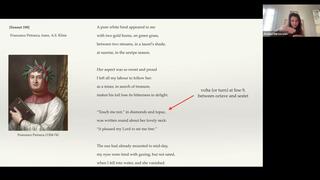
“part prison,
Part panic closet, a little room in a house set aflame.”
—from Terrance Hayes’s “American Sonnet for My Past and Future Assassin”
The sonnet, or “little song,” is one of our most familiar poetic forms. Short and compact, sonnets are deceptively simple poems that track the twists and turns of the human mind as it contemplates one thought and then another, or as it is seized by conflicting emotions that struggle to resolve into a coherent feeling, perspective, or desire.
This seminar will track the history of the sonnet from its origins in the Arabic muwashshah, a genre of poetry that emerged in Muslim Spain in the eleventh and twelfth centuries, to its popularization by the Italian poet Petrarch and its flourishing during the Renaissance, all the way to twentieth- and twenty-first century experiments with the form by poets like Ted Berrigan, Gwendolyn Brooks, Bernadette Mayer, Wendy Trevino, and many others.
Class meets from 2:30–3:45 p.m. ET on Wednesdays: Jan 15, 22, and 29.
This live, virtual course is structured to encourage active participation. Registrants will receive Zoom links a week before each session, a day prior to each session, and the morning of each session. All recordings will be made available within forty-eight hours of a session. All recordings and class materials will remain available for thirty days after the final session.
Scholarship applications must be submitted by Friday, January 10, at 10 a.m ET.
For information on how to register, how to receive the member discount, how to apply for a scholarship, how to access recordings and course materials, and more, please visit our FAQ page.


Anahid Nersessian was born and raised in New York City. She is the author of Keats’s Odes: A Lover’s Discourse (University of Chicago Press, 2021; Verso, 2022); The Calamity Form: On Poetry and Social Life (University of Chicago, 2020); and Utopia, Limited: Romanticism and Adjustment (Harvard University Press, 2015). She is currently writing a book called “How to Have Sex in a Poem.” The former poetry editor of Granta, she is also a frequent contributor to The New York Review of Books.
Registered attendees get access to live session links, recordings of past sessions, and all seminar materials.


